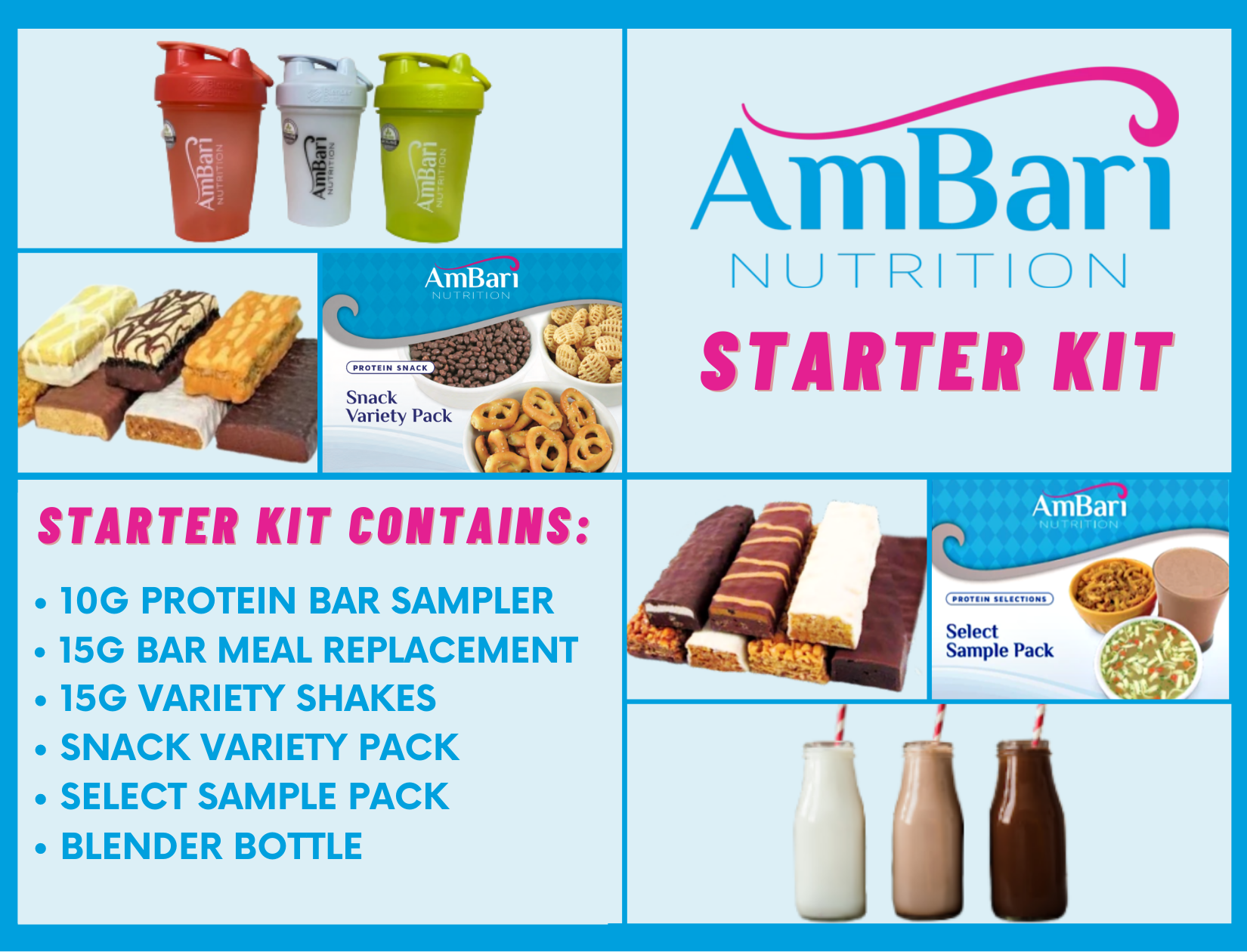Menu
Your cart is empty
Looks like you haven't added anything to your cart yet

The Importance of a High-Protein Diet While Taking Ozempic
Ozempic (semaglutide) is an injectable anti-diabetic medication that improves blood sugar control and promotes weight loss by acting on appetite-regulating pathways in the brain. However, the rapid weight loss associated with Ozempic can result in the breakdown of lean muscle mass if adequate protein is not consumed.
How Ozempic Causes Weight Loss
Ozempic mimics the effects of GLP-1, an appetite-reducing hormone produced in the intestines. Ozempic curbs appetite, leading to reduced food intake, calorie restriction, and significant weight loss for most patients. However, this rapid weight drop can sometimes lead to a loss of up to 30% lean body mass. Loss of muscle negatively impacts the metabolism long-term.
Potential Effects of Rapid Weight Loss While On Ozempic
Rapid weight loss from taking GLP-1 medications like Ozempic can cause a decrease in muscle mass, lessen bone density, and lower the resting metabolic rate, leading to sarcopenia. Sarcopenia is the gradual loss of muscle mass, strength, and function and is typically associated with aging. However, the accelerated weight loss triggered by Ozempic can hasten this process at any age if protein intake is not increased to preserve muscles. Loss of lean muscle mass and bone density from Ozempic’s weight loss effects can quicken the onset of sarcopenia.
The reduced muscle and lower metabolic rate makes maintaining weight loss more difficult. However, lifestyle changes such as increasing protein intake to around 25-30g per meal and incorporating strength and resistance training 2-3 times per week can help combat muscle and bone density loss while taking GLP-1 medications like Ozempic. Adequate protein and regular strength training promotes muscle protein synthesis and helps retain lean body mass and bone mineral density, preventing pre-mature sarcopenia.
Protein While Taking Ozempic

Recommended Protein Intake on Ozempic
Most experts recommend consuming 0.8-1 gram of protein per pound of body weight daily during Ozempic treatment. This is similar to protein goals for bariatric diets and medical weight loss programs. Consuming sufficient protein preserves lean mass even in a caloric deficit.
| Body Weight | 0.8 g/lb Recommendation |
|---|---|
| 120 lbs | 96g |
| 150 lbs | 120g |
| 180 lbs | 144g |
| 200 lbs | 160g |
| 220 lbs | 176g |
| 250 lbs | 200g |
| 270 lbs | 216g |
Timing Protein Intake
Aim to consume protein evenly throughout the day - about 25-30 grams at each meal and snack. Spacing protein allows for the best muscle protein synthesis. Consuming the majority of protein at night can be counterproductive. Morning protein intake is especially important to maintain muscle.
High Protein Food Sources
Focus on acquiring protein through whole foods like poultry, fish, seafood, eggs, Greek yogurt, cottage cheese, beans and lentils, nuts and seeds. Whey, casein and plant-based protein powders can supplement diet. Limit processed red meats and cheese high in saturated fat.
Incorporating Protein Supplements
In addition to eating high protein foods, protein supplements can help meet daily protein goals while on Ozempic. Meal replacement bars offer an easy way to increase protein intake between meals or as a snack. These bars provide 12-15g of protein and are designed for medical weight loss diets. For a morning protein boost or post-workout recovery drink, meal replacement protein shakes are another convenient way to get your protein without adding too many calories. These types of protein supplements can be very useful for optimizing your protein intake, which helps retain muscle mass when paired with the appetite and weight loss effects of Ozempic treatment. But real, whole food sources of protein should make up the majority of intake.
Here's our list of the 10 Best Meal Replacement Shakes For Diabetics

Ozempic and Protein Shakes
According to Dr. Huffman, protein shakes can be particularly beneficial for individuals taking Ozempic for weight loss for several reasons:
1. **Enhanced Satiety**: Protein is known for its ability to promote feelings of fullness. Consuming protein shakes can help reduce hunger and appetite, which is especially beneficial for those on a weight loss journey with Ozempic.
2. **Muscle Maintenance**: When losing weight, it's important to preserve lean muscle mass. Protein shakes provide essential amino acids necessary for muscle repair and growth, supporting muscle maintenance while on a calorie-restricted diet.
3. **Improved Metabolism**: A higher protein intake can boost metabolism slightly due to the thermic effect of food — the energy required to digest, absorb, and metabolize nutrients. This can aid in more effective weight loss when combined with Ozempic.
4. **Convenience and Portability**: For people with busy lifestyles, protein shakes offer a quick and convenient way to consume a nutritious, protein-rich meal without extensive preparation.
5. **Blood Sugar Management**: Protein has a minimal impact on blood sugar levels, making protein shakes a good option for managing blood glucose, which is particularly beneficial for individuals taking Ozempic, often prescribed for type 2 diabetes management.
6. **Dietary Compliance**: Incorporating protein shakes can add variety to a diet and help prevent boredom, which is key for long-term adherence to a weight loss plan, especially when using medications like Ozempic.
7. **Nutrient Intake**: Protein shakes can be fortified with vitamins and minerals, ensuring that individuals on a calorie-restricted diet still receive essential nutrients.
8. **Customizable**: Protein shakes can be customized to individual taste preferences and nutritional needs, making them a flexible addition to a weight loss diet.
9. **Supports Recovery**: For those who include exercise in their weight loss regimen, protein shakes can aid in recovery after workouts, helping to repair and rebuild muscle tissues.
10. **Controlled Calorie Intake**: Protein shakes can be designed to have a specific calorie count, helping individuals on Ozempic to maintain a consistent and controlled calorie intake for weight loss.
It's important to note that while protein shakes can be beneficial, they should be used as part of a balanced diet and not as the sole source of nutrition. It's also advisable to talk with your primary care physician or healthcare provider before making significant changes to your diet, especially when on medications like Ozempic and other GLP-1's.
What to Look for in a Weight Loss Protein Shake
Not all protein shakes are created equal. When shopping for a shake to help you shed pounds, here are the most important factors to look for... Continue Reading
Author: Carrie H. Carrie is a passionate health and nutrition writer who transforms complex medical research into accessible, evidence-based content to empower readers to make informed choices about their wellbeing. With a background in science and a dedication to helping others live healthier lives, she provides thoughtful analysis of the latest studies and practical, actionable advice readers can apply to their own lives. |
Reviewed By: Dr. Kevin Huffman Dr. Huffman is an accomplished board-certified bariatric physician with extensive clinical experience and expertise in treating obesity. He has trained countless healthcare providers and founded American Bariatric Consultants to develop highly sought-after protocols, training materials and continuing education used widely by medical societies, hospitals and physicians. Dr. Huffman's impact reaches far beyond direct patient care, as he actively prepares the next generation of physicians to achieve board certification in bariatrics, thereby exponentially expanding access to this vital medical treatment. |
- Choosing a selection results in a full page refresh.




































